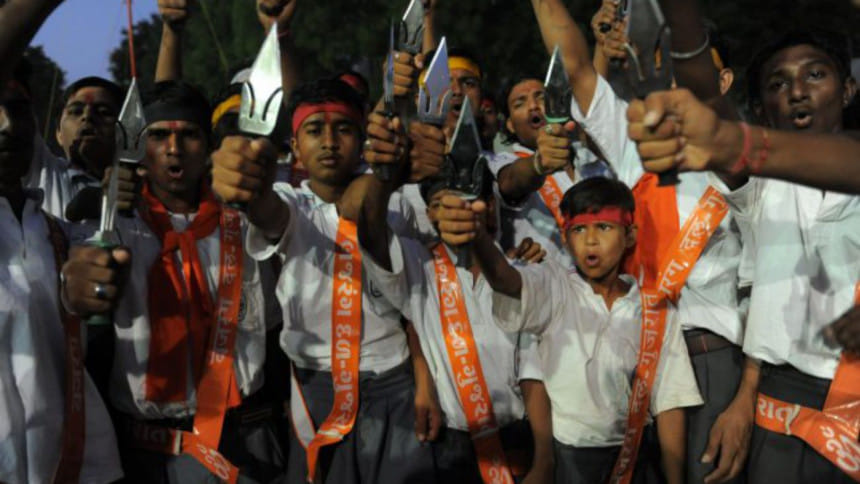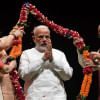The myth of Indian nationalism

The virulent propagation of nationalism in the wake of the Pulwama outrage reminds me of Arthur Schopenhauer's prophetic words in Essays and Aphorisms: "Every miserable fool who has nothing at all of which he can be proud, adopts as a last resource pride in the nation to which he belongs; he is ready and happy to defend all its faults and follies tooth and nail, thus reimbursing himself for his own inferiority."
Nationalism in its widest sense creates an unreal vision of oneness of religion, language and literature, indeed culture, caste, creed and territorial definition of a geographical area; those that do not comply are outlanders, fit for extermination. By its inherent machismo, nationalism is misogynist, brazenly racist and sectarian and often fatally violent, if we recount the persecution of Jews and Armenians. There is nothing wrong in possessing a sense of national pride. Indeed, the Peace of Westphalia (1645) was the starting point of nationalism that witnessed the emergence of the modern nation-state in Italy and Germany over two centuries later.
Nationalism presupposes the unification of people within a defined territorial jurisdiction, indeed people who are proud of their achievements in all walks of life. A belief they believe, or are made to believe by manipulative politicians, that ought to be propagated within and beyond a nation's domestic frontiers.
National self-respect, as defined by avaricious politicians, is but a continuation of this inherent belief in "superiority" that holds alternatives in utter contempt. Violation of national boundaries of nation-states certainly merits the strongest defensive reaction. However, when that is imbued by politicians with undue nationalistic fervour, it is projected as a national obsession. Dovetailing of domestic compulsions with foreign policy is often a cyanide-laden cocktail, as Germany, Italy and Japan disastrously consumed in World War II. Yet these nations rose from the ashes like the Phoenix in the next 75 years, about the same as India's independent existence.
To quote Hermann Goering, "We have slowly begun to create unity from the chaos of parties. Today these old parties play only a comic role. Now that the Reich once more firmly controls the individual provinces, the German people must be forged into a similar unity. They (national parties) had become too dulled to worry about the nation's fate. There was no point to it. Everything was too dismal, too tragic, the desperation was too great. And then, suddenly, the movement came, tearing through the clouds, suddenly there was light again, the sun shone.
Hundreds of thousands, even millions, of people suddenly woke up. The scales fell from their eyes and they saw something wonderful. They suddenly saw how a movement that had been insulted, outlawed, estranged, took the light in its hands. They were happy to see a new spring coming that would change everything. There was new joy, new hope. A faith that had been buried, that had been soiled, came alive. There was confidence, loyalty, discipline, faith, and hope: these are the pillars on which this movement must rest, because this movement has become the bearer of this powerful idea," (Nationalismus und Sozialismus: Rede auf der NSBO im Berliner Sportpalast am, 9 April 1933).
The war efforts of Germany and Japan, their quantum advances in military and scientific technology, education, health, employment, industrial production, etc., justifiably created the aura of invincible nationalism. For a decent job, a roof over the head and a better life, personal liberty and economic fortunes could be momentarily mortgaged. Nazi Germany fulfilled nearly all their promises in just six years, i.e. 1933-39. However, what of India?
How many "nationalists" have heard of Ram Mohan Roy's successful efforts to ban sati and child marriage (in tandem with the British Governor-General William Bentinck)? Remember Bhagat Singh but forget Savitribai Phule or Pritilata Wadedar, that it was the German and British Indologists like William Jones, James Prinsep and Max Mueller that broadcast India's rich cultural heritage to the world and whose sterling contributions remain firmly etched in world history and institutions like the Asiatic Society and the Indian Museum. Likewise, how many of us are able to recite Bankim Chatterjee's Bande Mataram with its Sanskrit intonations, or know that only the first verse of Tagore's Jana Gana Mana was adopted for our national anthem or that the first design of our national flag was crafted by a Mumbai-based Parsi woman called Madam Cama in 1907? The Parsis originated in Persia. How many of us have heard of Dwijendralal Roy, Kazi Nazrul Islam, Saadat Hassan Manto, and a myriad other littérateurs whose songs and books ratcheted up nationalistic support against the oppressive coloniser? Or of John Mortimer Wheeler or his Indian assistants like Rakhal Das Bannerjee who discovered Harappa and Mohenjodaro in 1921-23? Similarly, how many have heard of Anandibai Gopalrao Joshi and Kadambini Ganguly, India's first women doctors in the late 19th century? Or the Boroline—the cream that we use even today—a product of the freedom movement? Or the facts of our rich cultural and political heritage (dating back to the Mahajanapadas in c. 600 BCE) that have acted as the greatest unifying glue (e.g. the Sufi movement)? Or that those who slaughter our animals are Muslims, the tanners are Hindus and traders Gujarati Hindus?
The list of India's unknown heroes and heroines whose cumulative sacrifices won our freedom from colonial yoke is worn by every Indian on his/her sleeve. Being Hindu is one thing; to imbibe and propagate the inclusivity of Hinduism (as distinct from an aberrant Hindutva) and economic and social progress are the unique and stellar tests of nationalism, as much as it is the constitutional duty of a government to assure India's cosmopolitan view of life.
Has prosperity reached our shores that it should trigger our existing sense of nationalism, indeed our national pride? The Global Hunger Report 2017 gives India a score of 31.4, neighbouring Bangladesh scoring higher at 26.40 and Nepal at 22. In absolute terms, 189.70 million Indians (71 percent of South Asia) were estimated to be hungry while per capita food consumption for India was 2,354 against a developing country average of 2,683 and 3,439 for developed countries in 2010. Hunger had its invariable fallout on labour productivity. In 1990, India's land productivity at 719 was higher than China's 457 while the figures for labour productivity were 624 and 472 respectively. India retained its land productivity till 2013 but its labour productivity was bested by China with a figure of 1,128 against India's 951. Overall, India ranked 97th out of 118 in the Global Hunger Index, indeed an abomination for one of the world's largest economies. With rising imports of several agricultural commodities, expenditure on agriculture to agricultural GDP in 2014 was a negligible 5.94 percent when compared to China's 23.56 percent. Even Bangladesh spent 11.08 percent. China spent 0.62 percent on agriculture as a percentage of agricultural GDP against India's abysmal 0.31 percent on agricultural R&D. India overtaking France to emerge as the world's sixth largest economy recently only reflects the success of crony capitalism and consolidation of oligarchies, via their networks, not a square meal for an indigent Indian. Nor is purchasing power parity a lesser evil.
Where the rule of law becomes dysfunctional, different sets of laws apply to the privileged and the unprivileged. Democracy ceases to exist when the life, liberty and property of citizens are insecure; the distinction between a vendor and the state vanishes; poverty mitigation creates billionaires while the indigent masses remain deprived; and the crassest opportunism, corruption and nepotism become alibis for elections and governance. The lines of distinction between the Left, the Right and the Socialist-Liberals are obliterated by their gross political opportunism. Conscience is reduced to irrelevance in the opportunistic games of thrones. All proclamations of democracy are specious, yet remain the most potent and camouflaged instrument for oppression of unquestioning Indians. That is when democracy is reduced to a mockery.
The third stanza of TS Eliot's The Hollow Men aptly portrays the Indian landscape: This is the dead land / This is cactus land / Here the stone images / Are raised, here they receive / The supplication of a dead man's hand / Under the twinkle of a fading star.
Indians are justifiably proud of their rich heritage and are fiercely loyal to the country. We won our democracy after a 200-year struggle and the number of people who died is not far less than the combined body count for the two World Wars. The preservation of a democratic and inclusive nation is not something that is negotiable against "nationalistic" and cowardly politics of corruption and self-aggrandisement that is the surest sign of being anti-national, harking back to Schopenhauer's prophetic words.
Shantanu Basu is an Indian public policy analyst and commentator.
Copyright: The Statesman/Asia News Network










Comments